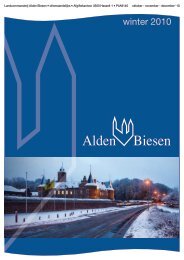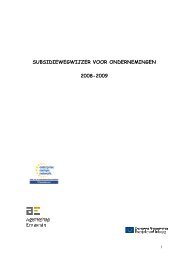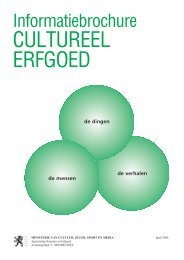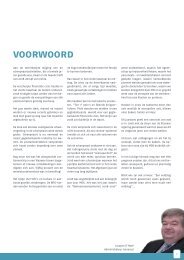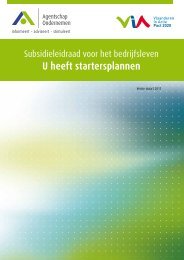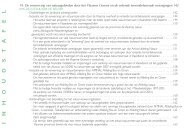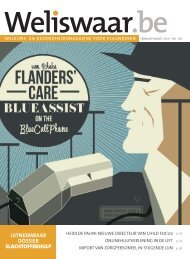Acknowledgements Book of abstracts - Publicaties - Vlaanderen.be
Acknowledgements Book of abstracts - Publicaties - Vlaanderen.be
Acknowledgements Book of abstracts - Publicaties - Vlaanderen.be
Create successful ePaper yourself
Turn your PDF publications into a flip-book with our unique Google optimized e-Paper software.
Piera Anna Martino presents Poster 34 during the poster sessions in the Aula.<br />
Session theme 4: Assessing health status <strong>of</strong> groups <strong>of</strong> animals in relation to welfare<br />
106<br />
Poster 34<br />
AN HEALTH MONITORING PROGRAMME IN A GROUP OF DOGS<br />
P.A. Martino 1 , F. Luzi 2<br />
1 Department <strong>of</strong> Veterinary Pathology, Hygiene and Public Health, Milano, Italy<br />
2 Department <strong>of</strong> Animal Science, Faculty <strong>of</strong> Veterinary Medicine, Milano, Italy<br />
The health <strong>of</strong> animals is always at risk from a variety <strong>of</strong> infections. Diseases in animals used for<br />
research, whether clinically manifest or subclinical, produce effects that change the outcome <strong>of</strong> the<br />
experiments. Depending on the specific infection, various biological parameters may <strong>be</strong> affected<br />
such as welfare, <strong>be</strong>haviour, growth rate, etc.. All the infections, also in healthy carrier animals, are<br />
likely to increase biological variability.<br />
For these reasons, an animal health monitoring programme is important <strong>be</strong>cause it can detect an<br />
healthy carrier <strong>of</strong> microorganisms, also decreasing the risk <strong>of</strong> pathogenic and/or zoonotic infection<br />
and adding to the reliability and reproducibility <strong>of</strong> research data.<br />
The aim <strong>of</strong> this work is to evaluate the healthy status <strong>of</strong> a group <strong>of</strong> dogs used for <strong>be</strong>havioural<br />
studies by means <strong>of</strong> a monitoring plan.<br />
Pharyngeal and rectal swabs were collected from 10 Beagle dogs, free <strong>of</strong> pathogenic bacteria<br />
according to FELASA guidelines, randomly selected, every three months. The dogs were bred for<br />
using in <strong>be</strong>havioural survey in a research facility in Italy. The speciments were streaked on selective<br />
media for identifying the pathogenic bacteria we have defined to monitor (Bordetella<br />
bronchiseptica for pharyngeal swabs; Salmonella spp., Shigella spp., Yersinia spp. and<br />
Campylobacter spp. for rectal swabs). The samples were incubated at 37 °C and at 42 °C (for<br />
Campylobacter isolation) for 24-48 hours under different atmosphere. The results, recorded as<br />
positive or negative, were reported in the health monitoring report.<br />
All the swabs result positive for the normal bacterial flora and always negative for the pathogenic<br />
strains we search in our health monitoring protocol. These negative results are successful and are<br />
very important <strong>be</strong>cause these dogs, free <strong>of</strong> pathogenic bacteria at the <strong>be</strong>ginning <strong>of</strong> the research,<br />
must persist negative during the <strong>be</strong>havioural trials. So, the health monitoring programme allows us<br />
to control this “healthy” status.<br />
Contact information: Piera Anna Martino or email piera.martino@unimi.it<br />
Complete address: Dipartimento di Scienze Animali, Sezione di Zootecnica, Veterinaria Università<br />
degli Studi di Milano via G. Celoria, 10, 20133 Milano, Italia<br />
Species: Dog



